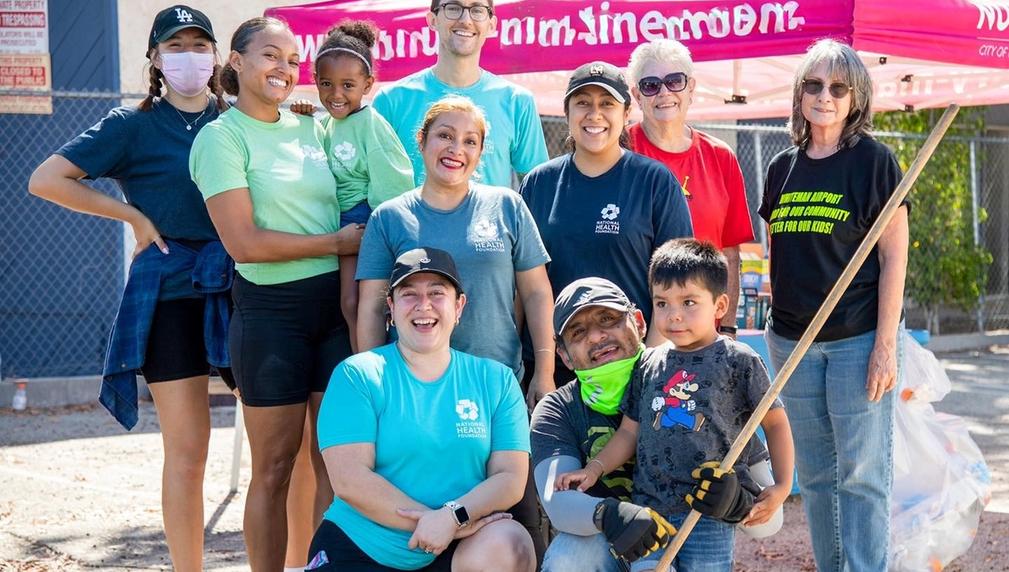NHF's Building Horizons: Improving Social Connectivity Across Generations
National Health Foundation’s Bridging Horizons program engages transitional-aged youth (TAY) and older adults in intergenerational dialogue and activities to reduce social isolation and improve community health outcomes. Through structured mentorship, wellness workshops, and community meetings, the program fosters meaningful connections and enhances participants' mental well-being. This initiative will utilize a comprehensive evaluation process to track progress and measure community level improvements in social connectivity.

What is the primary issue area that your application will impact?
Social support networks
In what stage of innovation is this project, program, or initiative?
Pilot or new project, program, or initiative (testing or implementing a new idea)
What is your understanding of the issue that you are seeking to address?
In 2023, the U.S. Surgeon General highlighted loneliness as a public health issue, linking it to increased risks of premature death and diseases such as stroke, anxiety and dementia. The American Time Use Survey identified social isolation is highest among adults aged 65+, who have the fewest in-person interactions. Yet, research at Cigna Healthcare found transitional aged youth (TAY), are twice as likely to report feelings of loneliness. Los Angeles' unhoused population mirrors demographics with the highest risk of social isolation. The U.S. Department of Housing and Urban Development's 2023 Homelessness Assessment revealed 1 in 4 unsheltered individuals are over 55. NHF aims to combat social isolation across generations with a focus on facilitating supportive transitions to permanent housing for older adults experiencing homelessness and preventing homelessness among TAY.
Describe the project, program, or initiative this grant will support to address the issue.
National Health Foundation’s (NHF) Bridging Horizons program utilizes an intergenerational model to build community across generations. NHF acknowledges social connectiveness as a priority that can impact community health outcomes and invites transitional aged youth (TAY) to participate in an internship to lead and participate in community meetings at our Arleta Recuperative Care and Interim Housing site for older adults. NHF’s newest facility offers a 148-bed recuperative care and interim housing program for older adults, aged 55+, experiencing homelessness while they recover from acute medical conditions and transition into permanent housing. Engaging TAY to lead community meetings with older adults (55+) will foster authentic mentorship opportunities, enhancing intergenerational relationships felt throughout the community. As highlighted in Question 6, these two age groups are among those most affected by social isolation and feelings of loneliness. Bridge Horizon’s community meetings will facilitate mutual learning, provide access to green space, share resources, and improve mental wellness through increased social connectivity. These gatherings will cover diverse topics such as community gardening, physical health and skill development. During their internship, youth will earn a stipend while enhancing their professional and interpersonal skills. All participants will benefit from reduced loneliness and increased feelings of purpose and connectedness.
Describe how Los Angeles County will be different if your work is successful.
Bridging Horizons will directly impact the intergenerational social connectivity in Arleta by reducing social isolation and loneliness. This model can be replicated across Los Angeles County to improve community-wide health outcomes. According to CDC’s March 2023 Morbidity and Mortality Weekly Report, social isolation or loneliness and lack of social and emotional support were the most reported social determinants of health (SDOH). In the U.S., lacking social connection is linked to a higher mortality measure when compared to smoking, physical inactivity, obesity and air pollution. As social connectivity increases, community health outcomes will show a reduction of premature deaths from all causes as demonstrated in the U.S Surgeon General’s Advisory on Social Connection. Overall, Bridging Horizons will contribute to a more connected, inclusive, and healthier Los Angeles County, where individuals of all ages feel a greater sense of community.
What evidence do you have that this project, program, or initiative is or will be successful, and how will you define and measure success?
The Bridging Horizons program was proposed to address Arleta’s health concerns. In 2023, NHF conducted a Community Health Barrier Analysis to assess community stakeholders’ concerns, where residents identified the following concerns: 1) a lack of community services for youth and older adults; 2) limited green space and park access; and 3) low access to mental health care. Our program targets these concerns through the implementation of intergenerational programming. The program will be hosted on the premises of NHF’s Arleta facility, where a 2,000 sq ft. green space will be designed and reserved for community building activities. NHF will measure program effectiveness using UCLA’s Loneliness Scale, a leading tool designed to measure subjective feelings of loneliness and social isolation. We will survey all participants upon entering the program and quarterly thereafter to establish a baseline and track progress.
Approximately how many people will be impacted by this project, program, or initiative?
Direct Impact: 600.0
Indirect Impact: 1,200.0